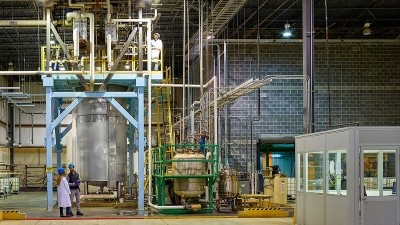Superbrewed Food secures self-affirmed GRAS status for 'postbiotic cultured protein,' expects first product launches in 2023

Unlike ‘precision fermentation’ startups deploying synthetic biology to genetically engineer microbes to produce target molecules, or companies extracting and isolating proteins from soy or peas, Superbrewed Food is growing Non GMO microbes (in this case, a bacterium commonly found in the human gut) for consumption as a whole food source.
While some other players such as Nature’s Fynd also grow protein-packed microbes as whole foods (sometimes referred to as ‘biomass’ fermentation), Superbrewed Food’s microbes are naturally much higher in protein (80%+), said Tracy, who plans to submit a GRAS notification to the FDA after an independent panel of experts found the firm had “demonstrated safety for consumption in a broad range of food applications, and that the ingredient poses limited risk as a food allergen.”
'The initial thrust is animal-free milks, cheese, creamer, yogurt, ice cream, nutritional beverages, healthy snacks and baked goods'
But what’s the attraction for food companies that are looking for new more sustainable sources of protein, but also want to use ingredients that consumers can recognize and understand?
According to Tracy - who has built commercial-scale production capacity for the ingredient and expects the first products containing it to hit shelves next year – the ingredient has a neutral taste, natural white color, excellent pH and temperature stability, and good emulsification properties. “Before you dry it, it looks just like milk.”
As for interest from industry, he said, “The initial thrust is animal-free milks, cheese, creamer, yogurt, ice cream, nutritional beverages, healthy snacks and baked goods" where it can be used to replace eggs in brownies and dessert breads, or to create high protein tortillas, for example.
He added: “We also like to explore the use of food product intermediates in a range of finished products, for example, our non-dairy cream cooks, bakes and sautés remarkably like dairy cream, so our team makes killer alt-cream based soups like creamy tomato and my personal favorite, Hungarian mushroom soup!”
The company also “demonstrated that the protein can be extruded in multiple formats such as simple texturized protein and high-moisture meat analogs as both a primary protein and in combinations with other plant proteins and ingredients."

'Per the ISAPP definition, our protein ingredient is exactly a postbiotic'
As for marketing, the ingredient meets the definition of ‘postbiotic’ laid out in the recently published ISAPP (International Scientific Association for Probiotics and Prebiotics) consensus paper (‘a preparation of inanimate microorganisms and/or their components that confers a health benefit on the host’), claimed Tracy. “Per this definition, our protein ingredient is exactly a postbiotic.”
While ‘bacterial’ protein might seem like a tough sell, the notion of consuming bacteria per se has become very well established thanks to probiotics (live microorganisms that confer a health benefit), although the bacteria Tracy is growing are not ‘live,’ but fully deactivated, and non spore-forming, he stressed.
Although most consumers are not yet familiar with the term ‘postbiotic,’ if they see the word on pack or in marketing communications, they will probably make a connection with probiotics and prebiotics (which have positive connotations), he said: “We are completely transparent that our protein ingredient is a postbiotic of bacteria origin, and we've observed that potential consumers are responding positively.”
'Five B-vitamins and the six essential minerals (not including sodium)'
Labeling in the US is a work in progress, he said, although the company has started using the term ‘Postbiotic Cultured Protein’ in its marketing communications.
“We describe it to consumers as a natural, whole food protein ingredient that is less processed compared to any other protein ingredient with comparable protein levels, e.g. soy protein isolate, pea protein isolate and whey protein isolate,” said Tracy.
“We purposefully avoid processing, as we want to preserve the extra nutrition components such as the five B-vitamins and the six essential minerals (not including sodium). It also includes significant amounts of healthy biogenic amines. This additional nutrition is in very bioavailable form, such as our B12, which is in the most bioavailable form called methylcobalamin as opposed to cyanocobalamin.”
'I think it is confusing at this time to try and define a whole new category for consumers'
But how does Superbrewed Food's ingredient fit into the whole plant-based trend, given that the ingredient itself is not plant-based?
Several firms producing proteins and other ingredients for meat, egg, and dairy alternatives are now facing similar challenges, said Tracy. These include new protein sources are from algae, euglena, or other marine organisms, or fungi, for example, while others are 'real' animal proteins, made without animals.
“I think it is confusing at this time to try and define a whole new category for consumers, and frankly, we don't need it as within all categories there is the ‘non-‘ way to label,” he said.
“For example, we can make an incredible non-dairy milk type beverage or a no-egg brownie. While our ingredient can stand alone, we are most likely to complement plant-based and precision approaches, as our ingredient's strengths supplement their weaknesses, which we will demonstrate in future disclosures. Thus, we are enhancing plant-based and precision, and making them more palatable, healthy, and affordable for a broader set of consumers.”

The origins story: Why are gorillas so strong on a plant-based diet?
Rather than discovering a microorganism growing in the soil, or in the wilderness, Superbrewed Food started by looking at the digestive system of powerful land mammals such as gorillas, who eat a 100% plant-based vegan diet, but have bacteria in their guts that convert the plant biomass they consume into proteins that make them strong and agile, said Tracy.
“So we’re looking at healthy digestive microbiomes. We said, there must be a protein specialist [bacteria] in there with a voracious appetite to consume plant biomass and grow with a super high concentration of protein. So the bacterium we’re using is literally native to our nutrition today.
“And to my knowledge, we’re the only company out there making food single-cell protein through anaerobic fermentation.
“Another thing that’s exciting is that a lot of anaerobic organisms produce and accumulate large amounts of B vitamins."
A 30-gram serving meets the FDA requirements for being a good source of five B-vitamins, including a full day’s supply of B12, and a good source of six essential minerals, such as iron, phosphorus and magnesium, he added.





















